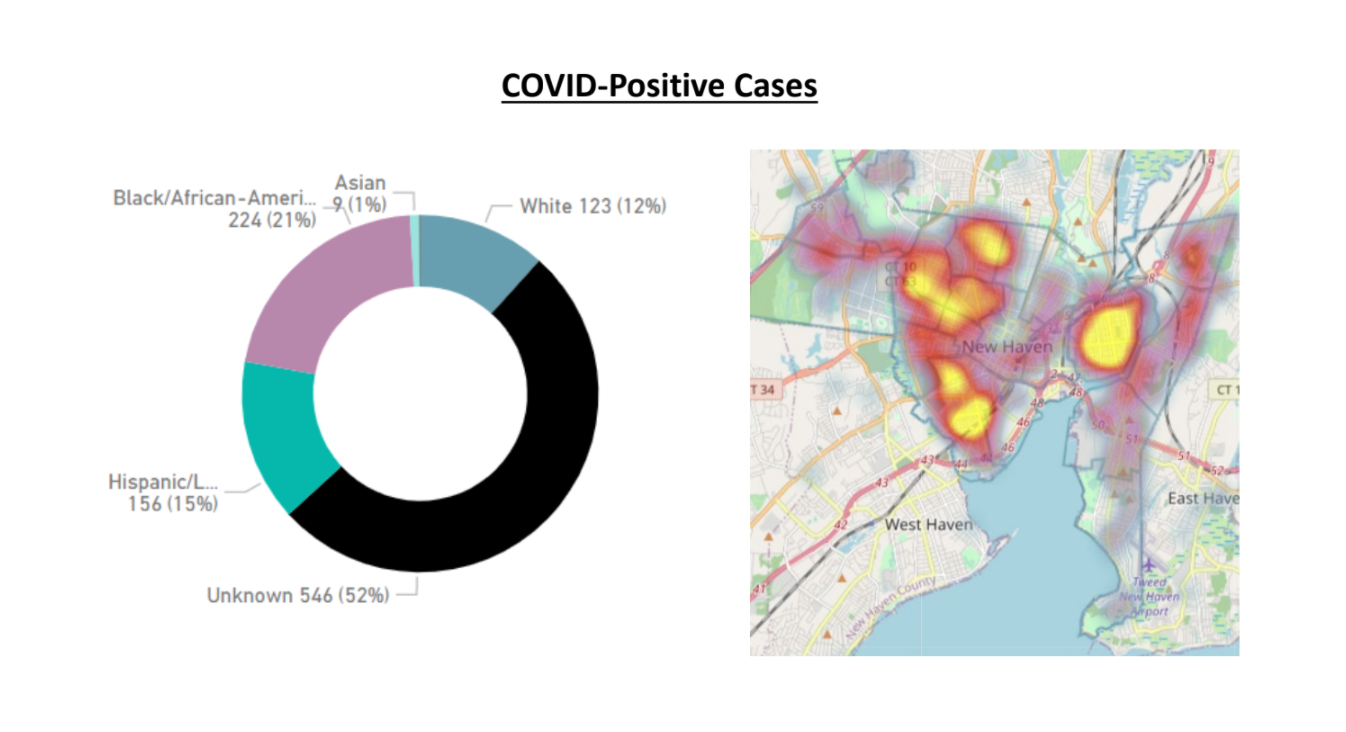
New COVID-19 racial data in the Elm City confirms existing trends: Black and Latinx New Haveners are more likely to contract, be hospitalized for and die of the novel coronavirus.
Board of Alders President Tyisha Walker-Myers called for action in Monday’s meeting, and on Tuesday, the city announced two new testing sites in minority neighborhoods and a third with an undetermined location.
Elicker announced the new testing sites in a Tuesday press briefing, joined by Cornell Scott-Hill Health Center CEO Michael Taylor, Fair Haven Community Health Care CEO Suzanne Lagarde and Murphy Medical Associates’ Steven Murphy. Cornell Scott and Fair Haven Community Health were already conducting small-scale testing but are now welcoming community members to make appointments at their clinics, located in Dixwell and Fair Haven, respectively. The health clinics’ sites will be accessible on foot — eliminating one of the barriers to testing in low-income neighborhoods. Testing will be free of charge regardless of insurance.
“On behalf of the Caucus, we are asking Mayor Elicker, the community and the entire Board of Alders to be bold together, so we can tackle the structural racism in our city that holds people back,” Walker-Myers said on Monday. “This is a call to action and the Black and Hispanic Caucus will be on the front lines to ensure that after this pandemic is over, New Haven will have a map that shows all people are benefiting with the opportunities that should be granted to every one of our residents.”
Walker-Myers drew attention to COVID-19’s disproportionate impact on racial minorities — in particular, black individuals — in her State of the City address delivered on behalf of the Black and Hispanic Caucus. In addition to addressing a range of other topics including jobs and environmental racism, the board president drew a parallel between historic redlining in the Elm City and the COVID-19 map that has emerged in recent weeks. She said the COVID-19 map’s hotspots are in unsurprising locations: Newhallville, Dixwell, Fair Haven and the Hill — the former two majority-black, the latter two majority-Latinx.
Local officials expected New Haven’s COVID-19 data to align with racial disparities across the country, and those suspicions were confirmed two weeks ago when Elicker first released the numbers of positive cases, hospitalizations and deaths by race. While the majority of positive cases do not have racial data — a major concern for city officials, and one that has persisted despite governmental memos sent to testing sites — the pattern has remained clear.
But the problem does not stop with incomplete data collection when patients are tested. Local leaders have also expressed concerns about a lack of testing availability in the first place. When presenting the initial racial data, Elicker and Health Director Maritza Bond focused on the need for increased testing in minority neighborhoods, in addition to noting a bilingual health campaign.
A newly-opened CVS testing center — which processes results in less than 15 minutes and can accommodate up to 750 cars per day — was a step in the right direction, officials said. But state Sen. Gary Winfield underscored that drive-through testing is only a solution for those who have a car, and many low-income New Haveners do not.
Local leaders have also pointed to a perceived stigma around testing in some minority communities, and several black men have gone public about their COVID-19 stories in the hopes of encouraging others to seek treatment. On Tuesday, Lagarde noted that trust is critical to developing a successful testing operation and highlighted Fair Haven Community Health Care’s long history in New Haven. The clinic was founded in 1971.
“One of the things that community health centers do is we’re in the community,” Lagarde said. “We build trust. We’re hoping that we can leverage that and bring in folks who might be fearful of testing.”
Lagarde and Taylor estimated that their respective clinics will be able to test one patient every fifteen minutes and turn around results within two to three days.
Murphy, a New Haven native now based in Greenwich, is running drive-through testing sites in Stratford, Stamford, Westport, New Canaan and Darien. He and Elicker are discussing the ideal location for his site, which will also offer free tests to those with and without health insurance.
Cornell Scott and Fair Haven Community Health’s testing sites will open on April 22.
Interested in getting more news about New Haven? Join our newsletter!







